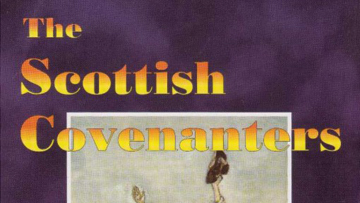You have free articles remaining this month.
Subscribe to the RP Witness for full access to new articles and the complete archives.
We have Abraham Lincoln to thank that each American knows that “all men…are endowed by their Creator with certain inalienable rights.” But, in the last generation, we have Johannes Gerhardus Vos (1903-1983) to thank for steadfastly insisting that this unnamed Rights Endower is the Lord Jesus Christ and that He also has rights that must be acknowledged by every individual, family, and legal state.
Vos had a distinguished career as a missionary in China, a pastor in Kansas, and a college professor in Pennsylvania, but a key feature of his printed legacy will be his Covenanter-inspired insistence that the rule of God may not be subjectivized, abstracted, or considered an optional “add on” to civilization. Consider how many of our country’s ills stem from our nation’s formal denial of (and informal apathy about) the present authoritative reign of the King of kings.
Jus Divinum or “the rights of God” was the core idea of Vos’ master’s thesis, written to complete his M.Div. degree at Westminster Theological Seminary in 1938. The following year the RPCNA Education & Publication Board published his work as The Scottish Covenanters, a book Dr. Byron Curtis says “remains an interesting and useful historical and doctrinal study of [Vos’] adopted denomination’s background” (see bluebanner.org/about).
The Scottish Covenanters encapsulated “second Reformation” Covenanter principles for an American audience and shaped the views of an entire generation in the RPCNA. In this work, Vos identified Erastianism (the idea that the state has supremacy over the Church) as a growing threat in the United States in the pre-World War II era. He noted in the preface that “real religious liberty is passing away, and the counterfeit, Erastian toleration, is taking its place. In the face of the present situation, the history of the Scottish Covenanters is both illuminating and encouraging.”
Vos sincerely hoped his work would reassert Covenanter principles, showing “the true independence and autonomy of the Christian Church as over against the encroaching demands of the State…[and] the sinfulness of compromise with Erastianism in any form whatever.” Vos was accused, as are many RPs today, of making a mountain out of a molehill. He was comforted by the example of the Covenanters, noting that “the extreme sensitiveness of the Scottish clergy to regal or legislative interference…is the result of long contending for a principle which was characteristic of the Covenanting movement, the principle of the sole headship of Jesus Christ of His House, the Church. While some of the Reformed churches on the Continent saw no harm in an Erastian establishment of religion…this idea early became anathema in Scotland…[because] Scotland was not reformed by the civil magistrate from above, but by popular [i.e. grassroots] religious teachers who permeated the whole of society with their doctrines.”
Vos realized that the Covenanters’ “formal” principle was the issue of the perpetual obligation of the National Covenant (1581, 1638) and the Solemn League and Covenant (1643). But he insisted that “the material principle is the mediatorial kingdom of Christ over the nation…both of these principles and also the principle of the sole headship of Christ over the Church can be reduced to a single fundamental principle: Jus Divinum—divine right or the rights of God, which are to be recognized in the Church, the State, and every sphere of life.”
Years later, beginning in 1964, Vos published Blue Banner Faith and Life to counter the encroachment of theological liberalism. This quarterly journal applied the vision of the Westminster standards and Covenanter distinctives to the present day. Not surprisingly, Vos reprinted Scottish Covenanters section by section in the magazine. In that first issue he laid forth the question, “Why be a Covenanter?” along with his insightful answer:
“[The Covenanter] accepts the doctrines and principles of the Church, not merely because of the tradition or authority of the Church, but because he is convinced in his heart and mind that they really are the doctrines and principles of the word of God, the Holy Bible. His loyalty is a loyalty to the written word of God. He realizes that to be a member of a religious denomination means giving his testimony and support, moral and financial, to the doctrines and principles of the denomination.” He went on to say that, “This kind of Covenanter is not a reed shaken by the wind; he is established firmly in his heart. He knows both what he believes and why he believes it. He can give real Bible reasons for his belief. As a member of the Covenanter Church he is convinced, honest, and faithful to his obligations, regardless of convenience, popularity, or reproach. He will receive the reward of a conscientious and consistent Christian” (Blue Banner vol. 1, Jan. 1946).
Just three years before his death, Vos was sounding the same note. In November 1980 he mourned that “the by-passing of God which the Covenanters of Scotland witnessed against is far exceeded by the modern secular humanism of America. On every hand it is assumed that ‘Religion’ is a private luxury of some people, having nothing to do with life…God is placed on a reservation, and education, culture, law, politics, and life in general are to proceed as if there were no God. In the face of this situation, the God-centered faith of the Covenanters is desperately needed. God is not dead, but His terrible judgment hangs over a nation that treats Him as an irrelevant private matter.”
In our own era of national executive overreach, political gridlock, and apathy to the comprehensive nature of truth, the 21st Century Reformed Presbyterian Church would do well to remember the spiritual legacy of the Scottish Covenanters and of Dr. J. G. Vos.
—Brad Johnston
